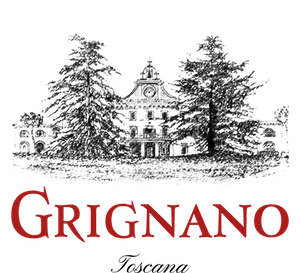The company
The high quality of tradition. Company philosophy is focused on the production of high-quality wines in keeping with the area’s identity. Every year, its particular geographical location gives us ripe Sangiovese grapes, following a production process which is environmentally sustainable, organic and cutting-edge.
The entire range of wines is characterised by being very drinkable, while retaining the potential to age over time, which ensures optimal longevity, in particular in reference to the Chianti Rufina Riserva wine, Poggio Gualtieri. Vanto dell’Azienda is the organic certificate which, since 2008, has certified that the whole production of grapes, wine, oil and cereals is organic.

A mission: excellence. To offer an excellent product – this is the aim of the Inghirami family and all the staff working at the Grignano Winery, who, over the years, have continued to invest in research and development to improve production of their own wines and oils. This represents a continuous commitment aimed at offering a synthesis of culture and the cutting-edge.

The company.The core of the Estate is the Grignano Villa, featuring an imposing clock on the south facade; this is a place where the past has been preserved intact, with a strategic location, close to the ancient borgo (fortified town) of Pontassieve, and just 12 km from the centre of Florence.


The Winery extends over 600 hectares, including over 40 farmhouses, each one having its own historic and architectural associations.">


The chief aim of the vines planted is to produce grapes with high quality profile, featuring traditional vine varieties such as Sangiovese, Colorino and Canaiolo Nero, alongside Cabernet Sauvignon and Merlot, while, in terms of white grapes, we could mention Trebbiano Toscano, Malvasia del Chianti and Chardonnay.
The olive grove on the estate is the source of an extra virgin oil made from organic olives with very low acidity and with characteristic organoleptic notes – these have earned the Winery the right to join the “Laudemio” Consortium, a group of companies producing extra virgin oil which has the reputation of being one of the best in Tuscany, and therefore in the world. But Grignano is also about nature: extensive woodland rich in truffles and mushrooms; a hunting reserve which is small but well supplied with game, being populated with pheasants and hares; an oasis of nature and fauna just a few kilometres from Florence.

The Wine-Cellar and Olive Oil Mill. Combining the ancient and the modern, the heart of the villa is in the wine-cellar, where the original surroundings have been enriched with new thermo-conditioned spaces in a natural way for the purpose of winemaking, using cutting-edge machinery, with wines ageing in the evocative barriques/barrels and storage area. The final level of the wine-cellar is where the modern Pieralisi olive oil mill is to be found.

The grand hall at the Villa and the Chapel. Inside the villa, the grand hall has capacity for up to 500 guests; it is an ideal location for events and ceremonies. This is elegant and joined to the private chapel, offering comfort, convenience, elegance and style for large banquets or corporate events.

The area. Grignano is situated in the heart of the Chianti Rufina area, which represents a historic wine-making area – among the most important in Tuscany. The fame of Sangiovese wine from Rùfina is derived from the geological make-up of the terrain, made of limestone, galestro and Alberese soils; exposure to the sun from a southern/south-westerly direction allows the grapes on the vines to achieve optimal ripening; finally, the microclimate, with high temperatures during the day and cool nights during the summer, contributes to maintaining the aromatic notes. The result is an elegant wine, with clear character, appropriately tannic, with an aroma evoking a complex bouquet of fruits of the forest and spices – this is the wine from the Grignano Winery.

The Pievecchia Winery. An ancient Tuscan parish where wine is produced. In the Florence area there are also numerous other old villas which have survived the ravages of time. Among these, is the Pievecchia, which dates back to the sixteenth century, and which since 1999 has been an annex to the Winery, and takes the name of the mediaeval parish church standing next to it.

